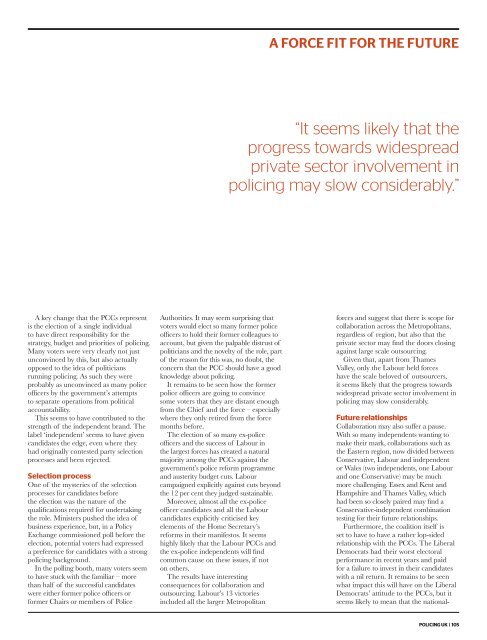Policing UK 2013 - Police Federation
Policing UK 2013 - Police Federation
Policing UK 2013 - Police Federation
Create successful ePaper yourself
Turn your PDF publications into a flip-book with our unique Google optimized e-Paper software.
A FORCE FIT FOR THE FUTURE<br />
“It seems likely that the<br />
progress towards widespread<br />
private sector involvement in<br />
policing may slow considerably.”<br />
A key change that the PCCs represent<br />
is the election of a single individual<br />
to have direct responsibility for the<br />
strategy, budget and priorities of policing.<br />
Many voters were very clearly not just<br />
unconvinced by this, but also actually<br />
opposed to the idea of politicians<br />
running policing. As such they were<br />
probably as unconvinced as many police<br />
officers by the government’s attempts<br />
to separate operations from political<br />
accountability.<br />
This seems to have contributed to the<br />
strength of the independent brand. The<br />
label ‘independent’ seems to have given<br />
candidates the edge, even where they<br />
had originally contested party selection<br />
processes and been rejected.<br />
Selection process<br />
One of the mysteries of the selection<br />
processes for candidates before<br />
the election was the nature of the<br />
qualifications required for undertaking<br />
the role. Ministers pushed the idea of<br />
business experience, but, in a Policy<br />
Exchange commissioned poll before the<br />
election, potential voters had expressed<br />
a preference for candidates with a strong<br />
policing background.<br />
In the polling booth, many voters seem<br />
to have stuck with the familiar – more<br />
than half of the successful candidates<br />
were either former police officers or<br />
former Chairs or members of <strong>Police</strong><br />
Authorities. It may seem surprising that<br />
voters would elect so many former police<br />
officers to hold their former colleagues to<br />
account, but given the palpable distrust of<br />
politicians and the novelty of the role, part<br />
of the reason for this was, no doubt, the<br />
concern that the PCC should have a good<br />
knowledge about policing.<br />
It remains to be seen how the former<br />
police officers are going to convince<br />
some voters that they are distant enough<br />
from the Chief and the force – especially<br />
where they only retired from the force<br />
months before.<br />
The election of so many ex-police<br />
officers and the success of Labour in<br />
the largest forces has created a natural<br />
majority among the PCCs against the<br />
government’s police reform programme<br />
and austerity budget cuts. Labour<br />
campaigned explicitly against cuts beyond<br />
the 12 per cent they judged sustainable.<br />
Moreover, almost all the ex-police<br />
officer candidates and all the Labour<br />
candidates explicitly criticised key<br />
elements of the Home Secretary’s<br />
reforms in their manifestos. It seems<br />
highly likely that the Labour PCCs and<br />
the ex-police independents will find<br />
common cause on these issues, if not<br />
on others.<br />
The results have interesting<br />
consequences for collaboration and<br />
outsourcing. Labour’s 13 victories<br />
included all the larger Metropolitan<br />
forces and suggest that there is scope for<br />
collaboration across the Metropolitans,<br />
regardless of region, but also that the<br />
private sector may find the doors closing<br />
against large scale outsourcing.<br />
Given that, apart from Thames<br />
Valley, only the Labour held forces<br />
have the scale beloved of outsourcers,<br />
it seems likely that the progress towards<br />
widespread private sector involvement in<br />
policing may slow considerably.<br />
Future relationships<br />
Collaboration may also suffer a pause.<br />
With so many independents wanting to<br />
make their mark, collaborations such as<br />
the Eastern region, now divided between<br />
Conservative, Labour and independent<br />
or Wales (two independents, one Labour<br />
and one Conservative) may be much<br />
more challenging. Essex and Kent and<br />
Hampshire and Thames Valley, which<br />
had been so closely paired may find a<br />
Conservative-independent combination<br />
testing for their future relationships.<br />
Furthermore, the coalition itself is<br />
set to have to have a rather lop-sided<br />
relationship with the PCCs. The Liberal<br />
Democrats had their worst electoral<br />
performance in recent years and paid<br />
for a failure to invest in their candidates<br />
with a nil return. It remains to be seen<br />
what impact this will have on the Liberal<br />
Democrats’ attitude to the PCCs, but it<br />
seems likely to mean that the national-<br />
POLICING <strong>UK</strong> | 105
















